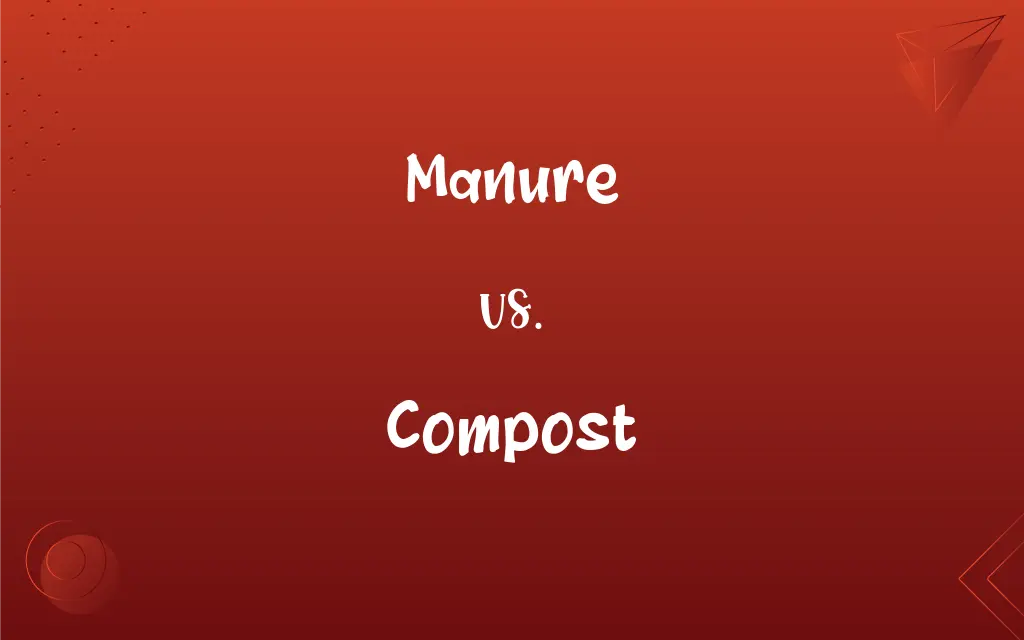Manure vs. Compost: What's the Difference?
Edited by Aimie Carlson || By Janet White || Published on December 18, 2023
Manure is animal excrement used as fertilizer; compost is decomposed organic matter used to enrich soil.

Key Differences
Manure is organic material derived from animal feces and sometimes bedding, used as fertilizer. Whereas,
compost is made from decomposed plant material, kitchen scraps, and sometimes animal manures, serving as a soil conditioner.
Manure typically contains higher levels of nitrogen, phosphorus, and potassium, essential for plant growth. On the other hand, compost offers a balanced mix of nutrients and beneficial microbes, improving soil structure and health.
Manure is a direct by-product of livestock and requires little processing before use. While, compost is produced through a controlled process of aerobic decomposition of organic materials, taking weeks to months.
Manure is commonly used in raw or semi-composted form in agriculture. Meanwhile, compost is used in gardening and landscaping to improve soil structure, moisture retention, and nutrient content.
ADVERTISEMENT
Manure can contribute to pollution if over-applied or poorly managed. However, compost promotes sustainable waste management by recycling organic materials and reducing landfill waste.
Comparison Chart
Source Material
Animal feces and bedding
Decomposed plant material, scraps
Nutrient Composition
Higher in specific nutrients
Balanced, diverse nutrients
Process of Creation
Direct by-product, minimal processing
Controlled aerobic decomposition
Typical Use
Agriculture as a direct fertilizer
Gardening, soil conditioning
ADVERTISEMENT
Environmental Considerations
Potential pollution issues
Encourages recycling, reduces waste
Manure and Compost Definitions
Manure
Animal excrement used as fertilizer.
The farmer spread manure over the fields for better crop yield.
Compost
Decayed organic material used as soil fertilizer.
Adding compost to the garden improves soil health.
Manure
Organic matter for enriching soil.
Manure from cattle is often used in organic farming.
Compost
Recycled organic waste for enriching earth.
Compost bins turn kitchen scraps into valuable soil additive.
Manure
A natural fertilizer from farm animals.
Horse manure is excellent for vegetable gardens.
Compost
Eco-friendly soil amendment from organic recycling.
Community gardens often use compost to promote sustainable practices.
Manure
Waste product used in agriculture.
Using manure helps recycle animal waste into nutrients.
Compost
A mix of decomposed plants and food waste.
The compost heap includes leaves, vegetable peels, and grass clippings.
Manure
A soil amendment from livestock.
Sheep manure is less strong and suitable for delicate plants.
Compost
A soil conditioner from decomposed organic matter.
Compost enhances soil structure and nutrient availability.
Manure
The dung of livestock or poultry.
Compost
A mixture of organic matter, as from leaves and manure, that has decayed or has been digested by organisms, used to improve soil structure and provide nutrients.
Manure
Such dung, or other organic or chemical material, used to fertilize soil.
Compost
To convert (vegetable matter) to compost.
FAQs
What materials can be composted?
Plant remains, kitchen scraps, and sometimes animal manure.
Can manure be used directly in gardens?
Yes, but it's often aged or composted to reduce strength.
Can manure lead to environmental issues?
Over-application or poor management of manure can cause pollution.
Is composting an eco-friendly practice?
Yes, it recycles waste and reduces landfill usage.
How does compost contribute to soil health?
It adds organic matter and beneficial microbes to the soil.
What is manure primarily made of?
Animal feces and sometimes bedding material.
What's the process of making compost?
Aerobic decomposition of organic materials over time.
Can all types of manure be used as fertilizer?
Most types, but some, like cat and dog manure, should be avoided due to pathogens.
Is manure richer in nutrients than compost?
Manure often has higher specific nutrient levels.
How does compost benefit the soil?
It improves soil structure, nutrient content, and microbial life.
Is composting a slow process?
It can take several weeks to months, depending on conditions.
What are the benefits of using manure in agriculture?
It recycles waste, improves soil fertility, and enhances crop yield.
How does compost affect water retention in soil?
It improves soil's ability to retain moisture.
Is manure a sustainable resource?
Yes, especially when sourced from organic farms.
Can manure be harmful to plants if used fresh?
Yes, fresh manure can burn plants due to high nitrogen content.
How does compost impact the environment?
It's a sustainable practice that reduces waste and enhances soil quality.
What type of manure is best for gardening?
Well-rotted or composted manure, like that from horses or cattle.
Can manure be used in organic farming?
Yes, especially when it's from organically raised animals.
Does compost need to be turned or aerated?
Yes, to ensure proper decomposition and prevent odor.
Does composting require special equipment?
A compost bin or heap is typically used, but no specialized equipment is necessary.
About Author
Written by
Janet WhiteJanet White has been an esteemed writer and blogger for Difference Wiki. Holding a Master's degree in Science and Medical Journalism from the prestigious Boston University, she has consistently demonstrated her expertise and passion for her field. When she's not immersed in her work, Janet relishes her time exercising, delving into a good book, and cherishing moments with friends and family.
Edited by
Aimie CarlsonAimie Carlson, holding a master's degree in English literature, is a fervent English language enthusiast. She lends her writing talents to Difference Wiki, a prominent website that specializes in comparisons, offering readers insightful analyses that both captivate and inform.







































































